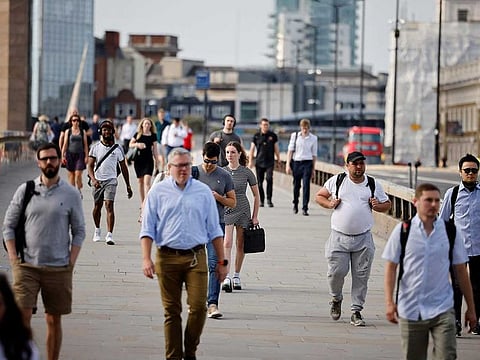UK to create new fast-track residency route for high earners
New UK residency route offers quick path for high-earning foreign workers

Dubai: The UK government has unveiled a fast-track route to permanent residency for high-earning foreign workers, an attempt by Prime Minister Keir Starmer to tighten immigration controls while preventing an exodus of skilled professionals from the City of London and other economic hubs, according to Bloomberg.
Under the proposed changes, visa-holders who earn more than £125,000 ($163,000) a year will be allowed to apply for indefinite leave to remain (ILR) after three years, instead of the standard five-year period, and far sooner than the 10-year baseline the Labour government plans to apply to most migrant workers.
The accelerated pathway will also extend to entrepreneurs on Global Talent and Innovator Founder visas. Those earning between £50,000 and £125,000 will continue to follow the existing five-year requirement. Both groups will face stricter criteria tied to English-language proficiency and criminal-record checks.
“To settle in this country forever is not a right, but a privilege,” Home Secretary Shabana Mahmood told Parliament. “And it must be earned.”
Mahmood has spent the week announcing one of the most sweeping overhauls of UK immigration policy in decades, a central piece of Labour’s strategy to address voter unease over rising migration numbers and to blunt the appeal of Nigel Farage’s Reform UK party. The plans include a tougher crackdown on asylum seekers crossing the English Channel in small boats, representing a sharp departure from Labour’s historically pro-migration posture.
Starmer is also seeking to reverse a spike in legal migration that began under former Conservative Prime Minister Boris Johnson, who expanded work-visa schemes after Brexit and during the Covid-19 pandemic to mitigate labor shortages. The UK now faces the prospect of as many as 2.2 million people becoming eligible for ILR by 2030, with few constraints on benefit access.
In May, Starmer vowed to end what he called an “experiment in open borders,” announcing that most migrants would need 10 years before qualifying for ILR. The proposal set off panic among professionals who had relocated to Britain with the expectation of securing permanent status within a few years. Thursday’s fast-track framework appeared to ease those concerns for high earners.
Business groups welcomed the move. Louise Haycock, a partner at the immigration law firm Fragomen, said the policy would help companies reduce the costs associated with recruiting and retaining top-tier international talent. One City banker told Bloomberg he had been preparing to move to the United States after hearing of the possible 10-year rule, but decided to stay after hearing the new details.
Still, the proposals also create clear losers. Low-skilled care workers brought in on Health and Care visas, a program expanded after the pandemic, would face a minimum wait of 15 years before qualifying for permanent residency. Labour officials argue that the Conservatives should never have admitted such large numbers under those programs. Critics warn the restrictions will put additional strain on an already overstretched social-care system.
The government also plans to tighten eligibility for ILR more broadly.
Applicants must demonstrate:
a clean criminal record,
three years of payroll-tax contributions,
no debts owed to the state, and
proven English proficiency.
The Home Office will introduce a system of penalties, adding years to the baseline ILR timeline. Claiming benefits for fewer than 12 months will result in a five-year penalty; those claiming welfare longer will see a 10-year penalty. Mahmood also proposed limiting most benefits and social-housing access to UK citizens.
Migrants who enter the country through “illegal routes,” such as small-boat crossings, would receive a 20-year penalty in addition to the standard 10-year requirement. Following Mahmood’s earlier tightening of asylum rules, relatively few people are expected to qualify for ILR under that category.
Certain groups, including some public-sector professionals, will still be able to apply after five years. Migrants with English proficiency above the A-level standard will see the 10-year baseline reduced to nine. The rules will not apply to Hong Kong arrivals under the British National (Overseas) scheme, families of British citizens, or those under the Windrush or EU Settlement programs.
Madeleine Sumption, director of the Migration Observatory at the University of Oxford, said the new framework will make the UK “considerably more restrictive than comparable high-income countries” for many migrants. Care workers, she emphasized, will be among the most affected, losing the ability to move between employers, a vulnerability that comes amid widespread reports of abuse and exploitation in the sector.
“Major questions remain unclear,” Sumption added, “including what will happen to the children of the new generation of temporary migrants.”
Sign up for the Daily Briefing
Get the latest news and updates straight to your inbox






